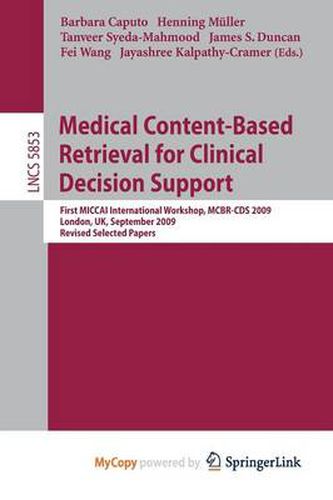Readings Newsletter
Become a Readings Member to make your shopping experience even easier.
Sign in or sign up for free!
You’re not far away from qualifying for FREE standard shipping within Australia
You’ve qualified for FREE standard shipping within Australia
The cart is loading…






This title is printed to order. This book may have been self-published. If so, we cannot guarantee the quality of the content. In the main most books will have gone through the editing process however some may not. We therefore suggest that you be aware of this before ordering this book. If in doubt check either the author or publisher’s details as we are unable to accept any returns unless they are faulty. Please contact us if you have any questions.
We are pleased to present this set of peer-reviewed papers from the ?rst MICCAI Workshop on Medical Content-Based Retrieval for Clinical Decision Support. The MICCAI conference has been the ?agship conference for the m- ical imaging community re?ecting the state of the art in techniques of segm- tation, registration, and robotic surgery. Yet, the transfer of these techniques to clinical practice is rarely discussed in the MICCAI conference. To address this gap, we proposed to hold this workshop with MICCAI in London in September 2009. The goal of the workshop was to show the application of content-based retrieval in clinical decision support. With advances in electronic patient record systems, a large number of pre-diagnosed patient data sets are now bec- ing available. These data sets are often multimodal consisting of images (x-ray, CT, MRI), videos and other time series, and textual data (free text reports and structuredclinicaldata). Analyzing thesemultimodalsourcesfordisease-speci?c information across patients can reveal important similarities between patients and hence their underlying diseases and potential treatments. Researchers are now beginning to use techniques of content-based retrieval to search for disea- speci?c information in modalities to ?nd supporting evidence for a disease or to automatically learn associations of symptoms and diseases. Benchmarking frameworks such as ImageCLEF (Image retrieval track in the Cross-Language Evaluation Forum) have expanded over the past ?ve years to include large m- ical image collections for testing various algorithms for medical image retrieval and classi?cation.
$9.00 standard shipping within Australia
FREE standard shipping within Australia for orders over $100.00
Express & International shipping calculated at checkout
This title is printed to order. This book may have been self-published. If so, we cannot guarantee the quality of the content. In the main most books will have gone through the editing process however some may not. We therefore suggest that you be aware of this before ordering this book. If in doubt check either the author or publisher’s details as we are unable to accept any returns unless they are faulty. Please contact us if you have any questions.
We are pleased to present this set of peer-reviewed papers from the ?rst MICCAI Workshop on Medical Content-Based Retrieval for Clinical Decision Support. The MICCAI conference has been the ?agship conference for the m- ical imaging community re?ecting the state of the art in techniques of segm- tation, registration, and robotic surgery. Yet, the transfer of these techniques to clinical practice is rarely discussed in the MICCAI conference. To address this gap, we proposed to hold this workshop with MICCAI in London in September 2009. The goal of the workshop was to show the application of content-based retrieval in clinical decision support. With advances in electronic patient record systems, a large number of pre-diagnosed patient data sets are now bec- ing available. These data sets are often multimodal consisting of images (x-ray, CT, MRI), videos and other time series, and textual data (free text reports and structuredclinicaldata). Analyzing thesemultimodalsourcesfordisease-speci?c information across patients can reveal important similarities between patients and hence their underlying diseases and potential treatments. Researchers are now beginning to use techniques of content-based retrieval to search for disea- speci?c information in modalities to ?nd supporting evidence for a disease or to automatically learn associations of symptoms and diseases. Benchmarking frameworks such as ImageCLEF (Image retrieval track in the Cross-Language Evaluation Forum) have expanded over the past ?ve years to include large m- ical image collections for testing various algorithms for medical image retrieval and classi?cation.